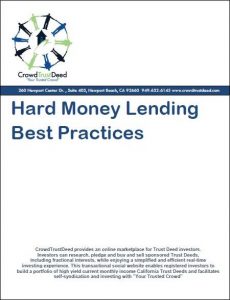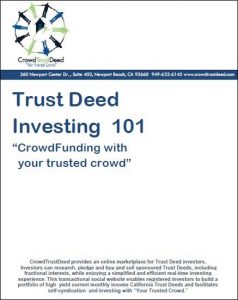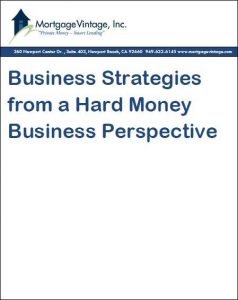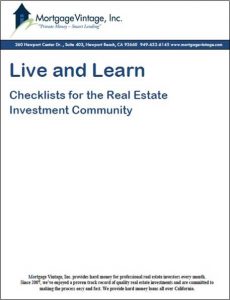Who can Benefit from Trust Deed Investments?
Investors in Trust Deeds understand and appreciate the value of real estate as well as certain fundamentals about real estate lending. They like the fact that real estate is a tangible asset. An investor can visually inspect the property securing the loan — they can actually walk through it, examine it and touch it. There is simply no mystery. Mortgage Vintage embraces its role as a service provider and recognizes that this is the investor’s personal capital. We believe that the Trust Deed Investor should have sufficient knowledge and the understanding necessary to make intelligent decisions about how to choose their investments.
In addition to owning a tangible asset, Investors who require diversification and consistent returns also benefit from Trust Deed ownership. These Investors could include: financial managers, IRA/401k holders, family trusts, high net worth individuals and smaller investors seeking to balance and diversify their investment portfolios.
Why Would Someone Pay over 10% for a Mortgage Loan?
The typical borrower for these loans is one who has not used their home as a revolving line of credit to fund their lifestyle, but one who has worked hard to build equity in their home. They are experiencing a life event; divorce, loss of job, illness, or death of a family member. This has caused a need for non-traditional financing, and due to the current credit crisis, this becomes their only option. The loans that we provide may help them solve their issue and get back on the road to recovery.
How Does It Work?
Mortgage Vintage serves as the mortgage lender on the transaction, applying stringent underwriting guidelines, and standardized processes and procedures. After the loan has closed, Mortgage Vintage will make the loan available for purchase to qualified third parties. We have partnered with FCI Lender Services, a professional servicing company, to handle all of the servicing (payment collection and borrower interaction) as it relates to the trust deed that you own. We work with FCI to handle all the interaction with the borrower so the owner of the loan can relax and just receive their monthly payments.
What are the basic steps Mortgage Vintage uses to make a loan?
The basics of trust deed investments are relatively easy to understand:
- Establish the value of the property being provided as collateral
- Evaluate the amount of the loan request
- Include any loans senior to the loan you are being asked to make
- Determine the loan-to-value
- Determine the Net Equity
- Carefully evaluate the borrower’s track record and ability to repay the debt
- Perform Due Diligence on the property, borrower and loan application
- Make funding decision
- Originate Loan
- Service the loan and make payments to the Investor
Isn’t this Predatory Lending?
No. Every loan that we do is run through an industry leading compliance tool to be sure that we are in total compliance with all Local, State, and Federal regulations. Additionally, we ensure that the loan has a solid Net Tangible Benefit to the borrower – meaning that the loan must give them some significant benefit that puts them into a better situation. If there is not a significant benefit to the borrower, we won’t do the loan.
Can I invest in a fraction or portion of a loan?
Yes. Mortgage Vintage offers a variety of Trust Deed investments including fractional or whole interests. In these investments you would own an undivided interest (either a partial or whole interest) in a specific property, with the note describing the terms of repayment by the borrower and the deed of trust providing the security.
What is the minimum investment amount?
$25,000
What about Loan-to-Value Ratios (LTV)?
At Mortgage Vintage, we are most interested in the preservation of our Investors principal investments, and because of this, we originate extremely conservative loans. The key to underwriting secure loans is substantial equity in the property, which is demonstrated in low Loan-to-Value ratios. Typically, a financial institution will lend up to 80%, 90%, 100% or even more of the value of the real estate securing the loan, leaving little or no equity protection. At Mortgage Vintage, our average LTV is substantially lower (historically in the 55% to 65% range), resulting in a higher average protective equity cushion for our Investors.
The LTV ratio is determined by dividing the total encumbrance (Loan) by the value of the property. Mortgage Vintage helps to maintain a comfortable margin by typically not exceeding 65% for all of our loan programs. For example: if a property were to appraise at $1,000,000.00, we would only lend up to, and not exceeding $650,000.00. This conservative approach to lending, in addition to our analysis of the borrowing entity has facilitated a 100% performing loans track record.
How do I know the property values are accurate?
The realistic market value of the property is determined by an appraisal effort that compares the subject property to other similar properties in the same community. Our specialized team which in many cases includes a qualified real estate appraiser will look at recent sale prices of comparable properties, and make adjustments to the value of the subject property based on factors such as size, location and physical condition. Mortgage Vintage, depending on the property, leverages Licensed Third Party Appraisers, Broker Price Opinions (BPO’s), Automated Valuation Models (AVM’s) and personal inspections of properties to determine accurate values.
What about the new regulations regarding a borrower’s ability to repay the Loan?
In addition to the detailed review of the underlying collateral to form an accurate market valuation of the property being secured, Mortgage Vintage will be using standard credit underwriting procedures in determining a borrower’s ability to repay the loan. A typical loan package will include a loan application, credit report, preliminary title report and income/asset verification and appraisal. Our underwriting processes may include the review of the borrower’s credit report, employment history, income history, exit strategy and personal reserves to determine the creditworthiness of the applicant.
What types of Loans will Mortgage Vintage originate?
The Company will target underserved residential lending segments; including credit impaired and reduced income documentation loans. The Company will originate primarily first deeds of trust for residential properties maintaining high equity positions. The Company will primarily be involved with Non Owner Occupied residential properties, however in special circumstances, the Company will lend on Owner Occupied homes.
What is the typical Borrower Profile?
For refinances, the typical borrower for these loans is one who has not used their home as a revolving line of credit to fund their lifestyle, but one who has worked hard to build equity in their home. Sometimes borrowers are experiencing a life event; divorce, loss of job, illness, or death of a family member. This life event creates a need for cash that can be acquired through the equity in their property.
For purchases, many times the borrower is an investor looking to finance the acquisition of a Real Estate Owned (REO) property. These high quality borrowers plan to “fix up” these REO’s and may not be able to find conventional financing for a number of reasons including their desire for a short term, their number of investment properties, the condition of the REO and their self employment status.
How will Mortgage Vintage underwrite the Loans?
The Company will apply stringent underwriting standards to minimize risk. The Company will underwrite only those loans which meet predetermined loan-to-value tolerances, as defined by Management and outlined in the Underwriting Guidelines with a targeted maximum Loan to Value of 65%.
The Company will apply a conservative and triangulated valuation approach to all collateral assets, consisting of a Broker-Provided Opinion (BPO) of the value at which the property can be sold within 30 days, as well as the use of AVM (Automated Valuation Models) and an independent third party appraisal where required.
A borrower’s ability to repay the loan and/or exit strategy will be fully documented.
What is the Geographic Lending Area?
The Company will originate transactions primarily in California.
What are the Loan Sizes?
The minimum loan size will be $50,000. Maximum loan size is $1 million.
What are the Loan Terms?
Loan terms will be determined based on the type of loan being completed. Smaller balance residential transactions will typically be 3 years with a balloon fully amortized over 30 years. Loan terms can be as short as 6 months or as long as 5 years. Interest only loans may be available depending on the borrower. Jumbo and super jumbo transactions will typically be structured as one year bridge financing.
How does the Trust Deed Process work?
Most loans are brought to Mortgage Vintage by local banking and mortgage loan officers who have borrowers that need extra cash and do not qualify for traditional bank loans. Once Mortgage Vintage qualifies the borrower and the property, we then seek outside investors who might want to participate in the loan. Typical investment amounts are in increments of $25k, but may be larger depending upon the loan amount.
For example, if you decide to invest $100,000 in a 12% Trust Deed with a 10.5% payment and a term of 36 months, you would receive a monthly check in the amount of $875.00 for 36 months with payment of your $100,000 principal investment at the end of the loan term.
Mortgage Vintage investors can pick and choose the loans they wish to participate in. Once they express interest in a loan, we provide the investor with all the information on the loan including the loan application, a recent appraisal and a preliminary title report. All loans are escrowed by local title companies which record the trust deed with the name of each investor listed on the Trust Deed. The company will be placing a portion of these loans into their portfolio and selling a portion to qualified third party Investors.
Do you have further Questions?
Some questions are sure to arise. Call us. We’re always eager to talk about trust deeds and explore how they might fit your financial picture. In fact, our team prides itself on the creation of innovative solutions that best suit the individual needs of our clients. We also know from experience that everyone’s needs are different, so we encourage you to confer with your legal and financial advisors when making any investment decisions.




